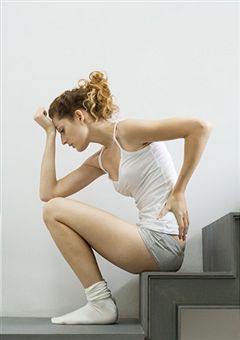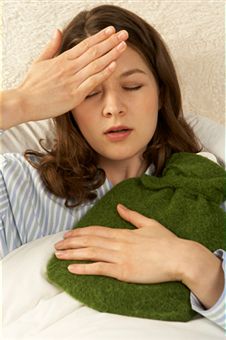Menstrual Problems
Could It Be More Than Just a Pain in the Abdomen?
Is it really that time of the month already, has it been 28 days? Do you dread certain parts of the month because you know what you have in store for you? If you are between the ages of 12-45, then you can relate to the problems that many women have to deal with every month. Cramps, bloating, and discomfort are some of the issues you may face on a monthly basis. Fortunately, not every woman experiences these problems, but at one time or another may have.
Menstruation, which is when the uterus begins to shed its lining if fertilization has not occurred. There are hormones produced when menstruation begins called prostaglandins. Prostaglandins indicate to the uterus that it is time to start disposing of its inner lining. The uterus is a muscle that is very strong and will start contract once levels of prostaglandins are reached. High levels of prostaglandins are said to be the cause of cramping or muscle spasms that occur in the uterus.

Do you have a normal menstrual cycle? Well that is hard for anyone besides you to answer. What is normal for one woman may be completely abnormal for another woman. Menstrual cycles differ drastically between women. The average length of a menstrual cycle is between two and seven days and can arrive as frequent as every 24 days. The amount of flow that occurs also varies among woman. Some may bleed heavy for the first 2 days and then reduce the amount as there cycle moves forward.
Causes
Every woman is not susceptible to these annoying monthly misfortunes. There are contributing factors that target certain groups. Being over-weight can definitely be a cause of menstrual problems; this is due to the face that when you are over-weight your fat cells produce more estrogen than is needed. When your body starts to produce excess amounts of estrogen, you body will start to believe that you are pregnant, and menstruation will change, or stop altogether.
Being greatly under weight can be just as much of an issue as being over-weight. Poor nutrition or malnourishment means that your body isn’t getting enough nutrients and vitamins that it needs. Therefore, your body doesn’t function the way that it should. Being under weight may also cause Amenorrhea, which is when your period doesn’t come at all.
Genes also play a role in this cycle as well. You should be aware of your family history and inquire if anyone else related to you has experienced these same issues. Your birth control could also be playing a part in your discomfort. Any Intrauterine Devices (IUD) may cause heavy bleeding and painful cramps, whereas when taking a birth control pill can actually relieve symptoms by reducing the length of your menstrual flow and regulating it.
Menstrual Problems? Get Remedies Fast!
Home Remedies
Although there is no known cure for menstrual problems such as fatigue, bloating, or cramps, there are some common treatments that you can try at home. A great way to try and reduce bleeding during menstruation is by eating foods that contain bioflavonoids, such as seeds or nuts. With heavy bleeding, your iron levels become very low, so you are going to want to seek foods that are rich on iron, like, shellfish, fortified breads, citrus fruits, and apricots.
Many soothing aids can be found right in your own home with no added costs for you. Cinnamon has an antispasmodic and acts as an anti-inflammatory, which can reduce cramping. Simply, make a cup of tea and add a dash of cinnamon to your delicious warm beverage and wait for results. Ginger is also said to work just as well as cinnamon to help in reducing the signs of cramps.
Perhaps you are experiencing some pain in either your neck or your back, try some basil. Basil is a great tool to relieve headaches and backaches. Caffeic acid, which is found in basil acts as a pain reliever. You may also want to try and soak in a nice warm bath. The heat from the water is sure to relax your muscles and ease your pain.
Water
Water is also a key element that you want to include in your diet everyday. The consumption of water is beneficial to clean or flush out your body and get rid of unwanted waste. Remember to drink at least 8 glasses of water a day. This can also be beneficial if you are prone to acne while menstruating. Water is great for the skin and keeps it hydrated.
OTC Medicine
Over the counter aids such as Pamprin or Midol are commonly used to treat these types of conditions. They work great to reduce water retention that causes bloating, also to relieve minor head and back aches. These medications should only be used as the directions indicate on the package.
Medical Issues & Treatments
Perhaps you have tried all of these methods but to no avail, you may want to call and speak with your doctor, there may be something more going on. Depending on your symptoms, your doctor may prescribe you hormone treatments. There are also anti-prostaglandins available through your doctor that would help with the abdominal pain that you feel. For more invasive procedures your doctor may think it is necessary to have a dilation and curettage (D & C). During this process a portion of the uterus is removed making it easier and more manageable to shed the lining monthly. This procedure is very rare today and not used as often as it was many years ago.
If you occasionally experience some of these troublesome ailments I wouldn’t fret, it’s when your menstrual cycle becomes abnormal in any way that may cause alarm. There are many serious menstrual problems that you may encounter, that are slightly more crucial, and above the mild cramping you may experience. There are many factors that doctors use to determine what the exact issue is, so treatment can begin as soon as necessary.
Fibroids
Fibroids are a common issue that doctors treat on a regular basis. Fibroids are growths inside of the uterus that are non-cancerous. Some of the warning signs include: bloating and swelling in the stomach, heavy and painful menstruation, and a dull pain in the abdomen. You can use these signs as an indicator; however, fibroids sometimes offer no warning signs at all. During your regular yearly examine is when your doctor would notice these growths.

Depending on the severity of your case and the pain it brings, treatment could be as minor as letting them take care of themselves, if they are small enough, or in rare cases having a hysterectomy, which would entail removing the uterus. Fibroids grow due to high levels of the hormone estrogen. The good news is that again, depending on the size, once you reach menopause your hormone levels decrease and these fibroids reduce in size and almost disappear.
Abdomen Pain & Endometriosis
If you are experiencing a sharp pain in your pelvic or abdomen area, along with your normal cramps, or experience pain after having sexual intercourse, this is something you are going to want to mention to your medical professional. These are common signs of Endometriosis.
Endometriosis is one of the main causes of pain in that region of your body. There is still no sure reason what causes Endometriosis, or how to cure it fully at this point. There are many treatment options that you may want to research. Since pain is the leading complaint, often doctors will prescribe a pain killer of some sorts, depending on allergies.
Hormone treatments may also be an option. It is shown that large levels of oestrogen on set Endometriosis, with the hormone treatments, doctors are trying to keep these levels at bay. As mentioned there is no sure cure for Endometriosis, so what relief that you do experience, unfortunately, are only temporary and will not last.
PMS
Possibly you are experiencing both emotional and physical issues, and are starting to feel depressed or anxious. This could be more than just Premenstrual Syndrome (PMS). There is a severe case of PMS referred to as Premenstrual Dysphoric disorder or PMDD. While doctors are not fully aware of the causes of PMDD, they do believe that it could be cause by a chemical imbalance of serotonin in your body. There are three avenues that should be taken into consideration.
- Psycho behavioral Therapy- This treatment is used to assist you in dealing with your emotions and sometime offer relaxation therapy, assist with providing you information to deal with coping skills, and cognitive behavioral therapy.
- Medication- Medication may be used in conjunction with the other treatment options. Different medications are used to treat PMDD. These drugs may include anti-anxiety medication, hormones, or anti-depressants.
- Diet modification- The amount of vitamins and minerals that your body takes in greatly effects the way your body will run. It is so crucial to stress the importance of a health balanced diet and regular exercise. You are also going to want to drink plenty or water. This not only keeps you hydrated, but is necessary to keep your body at its best.
Toxic Shock Syndrome (TSS) is a rare but serious infection caused by bacteria. TSS is associated most of the time with the use of tampons, or the overuse of tampons. When tampons are left in for a long period of time they become the perfect spot for the production of bacteria. Often TSS is caused by toxins that are produced by Staphylococcus aureus or (staph) bacteria. Some signs of TSS include:
- Vomiting and/or diarrhea
- A fever higher than102° Fahrenheit
- Muscle aches or weakness
- Confusion
- Headaches
- A bright red rash in your vaginal area
There are not any specific tests that can identify TSS, however through blood work, urine samples, and a cervical exam or scrape, your doctor can locate the issue and start treatment as necessary. Since TSS is a very serious condition, hospitalization may be required. You will be given antibiotics to assist in fighting the infection. Although extremely serious, this condition if caught soon enough, is not life threatening.
Costs of Treatment
Depending on the severity of your menstrual problems, costs can vary. For minor issues such as mild cramping, bloating, and fatigue you can try and use some of the known home remedies above to help and reduce some of the aches. If you require medical treatment for more severe menstrual problems then there are many things to consider.
Hormone treatments can be either in the form of a pill that is taken daily, or injections that may be self administered, either option does get costly. Including lab work, doctor’s visits, and the hormones themselves, you could be looking at about $150 a month or about $1,800 a year. Most insurance companies will cover medically necessary procedures, but you would want to check your benefits ahead of time to find out what your out of pocket expense would be.

2 Comments
My sister hav ulcer in stomach,
Is she take M2 Tablet for mens problem ?
Plz help me…!!!
She was 25 year old & unmarried ?